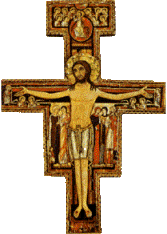St. Francis had never studied Sacred Scripture, but unwearied application to prayer and the continual practice of virtue had purified his spiritual vision, so that his keen intellect was bathed in the radiance of eternal light and penetrated its depths. Free from every stain, his genius pierced to the heart of its mysteries and by affective love he entered where theologians with their science stand outside. [Bonaventure; Major Life; Chapter XI; Section 1]
What St. Francis receives as 'eternal light' is never wasted; it is carefully pondered and diligently acted upon. This dual response of reflection and action (especially penitential action) sets him apart for God's spirit; so much so, that what is commonly received, even in the sacramental graces available to all, is in St. Francis raised to mystical heights.
Growth in understanding along with purification of body, mind and soul, went hand in hand in his ascent to sanctification. Each insight was a precious seed to be nourished and cultivated to full development. Not only deep meditation, but intense action was his road of holiness. Mortification of all spiritual distraction was continual; whether in his body, mind or soul. Each insight he received involved not only an understanding to gaze upon, but a decision to act upon. At each step he was carefully transformed into the likeness of Christ through insight and knowledge, along with continual 'dying to oneself'.
I am finding that my own spiritual growth lately comes in short burst where small and simple insights are strained and studied. What's missing for me is what St. Bonaventure refers to as the 'continual practice of virtue'. Pondering sacred scripture without 'the practice of virtue' is like hopping along on one leg. What St. Francis preaches by his own life, is that racing toward God takes two legs in coordinated strides: one of understanding and knowledge, the other in penance and bodily mortification. Knowledge of divine affairs and mortification of human affairs go together as complimentary characteristics of spiritual life: either alone is incomplete.
This 'inconvenient truth' is tempting to run away from, but we do so at our own peril. As difficult as the practice of penance is to embrace, it's critically important in revitalizing the Church and its members. We simply cannot reduce the spiritual life to a longing for union with the divine, without the elements of purification and mortification of our human nature. It's this integration of 'knowledge' and 'practice of virtue' in all its fullness that's at the heart of St. Bonaventure's observation: 'Francis enters where theologians stand outside'.
This lesson is beneficial for all members of the Church. It is hallmark for those of us who are called to spiritual life in the way of Francis. The twofold way in which the Seraphic Saint responded to the promptings of the Holy Spirit might today be called 'holistic' in that it embraces body, mind and soul. It transforms us more completely and more quickly. It directs our relationship more properly to God and neighbor. To carefully unpack the opening words of St. Bonaventure sets a framework for understanding and applying Franciscan spirituality. Hopefully my short reflection won't confuse the issue.
So after twenty plus years of profession it's time to begin anew; to re-enter with fresh insight the heart of the Franciscan calling: "The rule and life of the Secular Franciscan is this: to observe the gospel of our Lord Jesus Christ by following the example of St. Francis of Assisi, who made Christ the inspiration and center of his life with God and people." [Article IV: The Way of Life]






2 comments:
Welcome back! I hope your time away was refreshing!
Wonderful stuff! Thank you!
Your "two-legged" appeal to practical as well as noetic holiness reminds me of Francis' other great two-leggedness, his (hard-won) balance between contemplative and active life.
It also reminds me of St James' discussion of faith and works ;-)
Peace and all good
Mike
Post a Comment